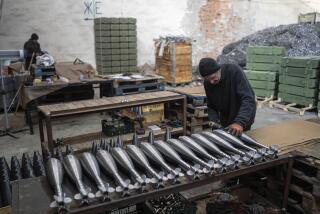War in Gulf Produces No Boom for Most Plants
Some military supply plants are keeping workers overtime turning out spare parts and stepping up production of hot items like the Patriot missile. But for most defense companies, the Persian Gulf War has not produced booming business or jobs.
Generally, planes, tanks and even guns take so long to order and build that the United States is fighting with its inventory of weapons designed during the Cold War. But some contractors say they have seen a big increase in workers’ productivity.
“I think our employees know these weapons are going to the allied forces and we’re proud of what they’re doing,” said Greg Black, director of human resources at Saco Defense Inc., in Saco, Me., a manufacturer of guns and grenade launchers.
The 38 employees of Greene Metal Products Inc. near Mt. Clemens, Mich., are averaging 70 hours a week making seats and other spare parts for military vehicles such as tanks, spokesman Bruce Wilden said. The company was busy before the war, and the overtime reflects a new deadline for existing orders.
Raytheon, in Andover, Mass., added about 200 people, and a Martin Marietta division in Orlando, Fla., has been working double shifts to produce the war’s first star weapon, the Patriot missiles that have shot down Iraqi Scuds. The United States has supplied Patriots to Israel, and approved sales to Saudi Arabia since war began.
“The Italians will be the next, and we understand that the Turks want to buy the Patriot too,” said Dave Harris, spokesman for the Army Missile Command in Huntsville, Ala.
The six-month buildup to war brought a mini-boom for suppliers of tires, helicopter rotor blades, shells, tank batteries and scores of other supplies.
But a spot check with contractors around the nation last week found many reporting no new orders, including the Army ammunition plants in northwestern Louisiana and Riverbank, Calif.; the General Dynamics Corp. tank plant in Lima, Ohio, and F-16 assembly line in Ft. Worth, Tex., and the Lockheed plant in Calabasas, Calif., that makes the Stealth fighter-bomber.
Fighter jets have been the most notable equipment lost by the United States so far, but even their makers are not seeing an effect on business.
“Our products take a long time to build,” said Susan Vassallo, a spokeswoman for Grumman Corp., of Bethpage, N.Y. “The F-14, for instance, takes three years from start to finish.”
Some specialty items have generated unusual business.
La Crosse Footwear Co. of La Crosse, Wis., added 20 to 25 workers to handle a $4-million order for 300,000 pairs of vinyl boots that fit over combat boots and protect against chemical weapons, said Vice President Patrick Gantert.
The Pine Bluff Arsenal in Little Rock, Ark., which refurbishes gas masks, hired 85 employees and is running 12-hour shifts on a six-day week, spokesman Dewey Spencer said.
The Defense Construction Supply Center in Columbus, Ohio, has employees working overtime to ship spare parts such as nuts, bolts and air filters.
Ammunition plants in New Brighton and Hopkins, Minn., have added a third shift and expanded the workweek from five to seven days, said Howard Schlaifer, a spokesman at Minnetonka, Minn.,-based Alliant Techsystems.
More to Read
Inside the business of entertainment
The Wide Shot brings you news, analysis and insights on everything from streaming wars to production — and what it all means for the future.
You may occasionally receive promotional content from the Los Angeles Times.










